Key takeaways:
- Reproductive health laws are complex and ever-evolving, significantly impacting individual choices and societal attitudes.
- Pro-life advocacy emphasizes the value of life and community support, influencing public perception and legislative change.
- Researching reproductive laws involves analyzing legislative databases, engaging with advocacy groups, and understanding the human experiences behind legal frameworks.
- Effective advocacy merges thorough research with personal stories, creating a compelling case for change in reproductive health policies.
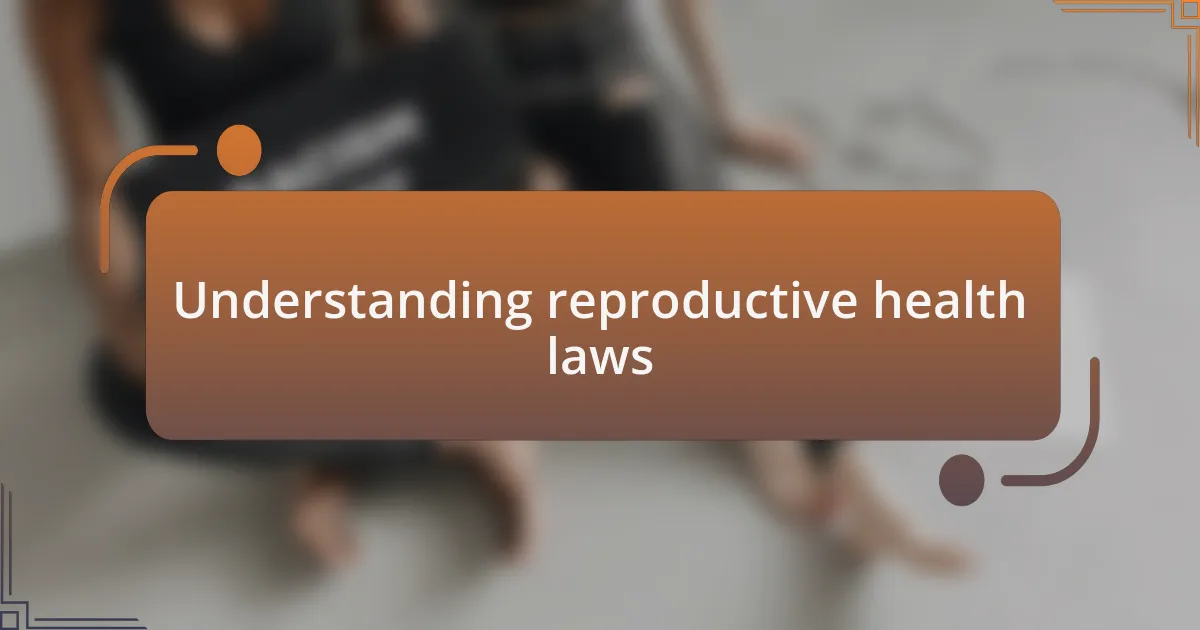
Understanding reproductive health laws
Reproductive health laws can often feel overwhelming due to their complexity and constant evolution. I remember feeling a mix of frustration and determination when I first dug into these laws for my advocacy work. It’s alarming how many people, even those directly impacted, lack familiarity with their rights under these laws.
As I explored various reproductive health policies, it struck me how they impact not only individual choices but also broader societal attitudes toward reproductive health. Why do we often take for granted the legal framework that influences such intimate decisions? This reflection deepened my understanding of how laws shape personal narratives and community values alike.
One thing I’ve learned is that these laws aren’t static; they’re deeply influenced by cultural, political, and social factors. In my experience attending local advocacy meetings, I’ve seen firsthand how community voices can challenge existing laws and push for change. Each story shared, whether from a personal struggle or a triumph, emphasizes the urgency for informed advocacy and the need for everyone to engage in these conversations.
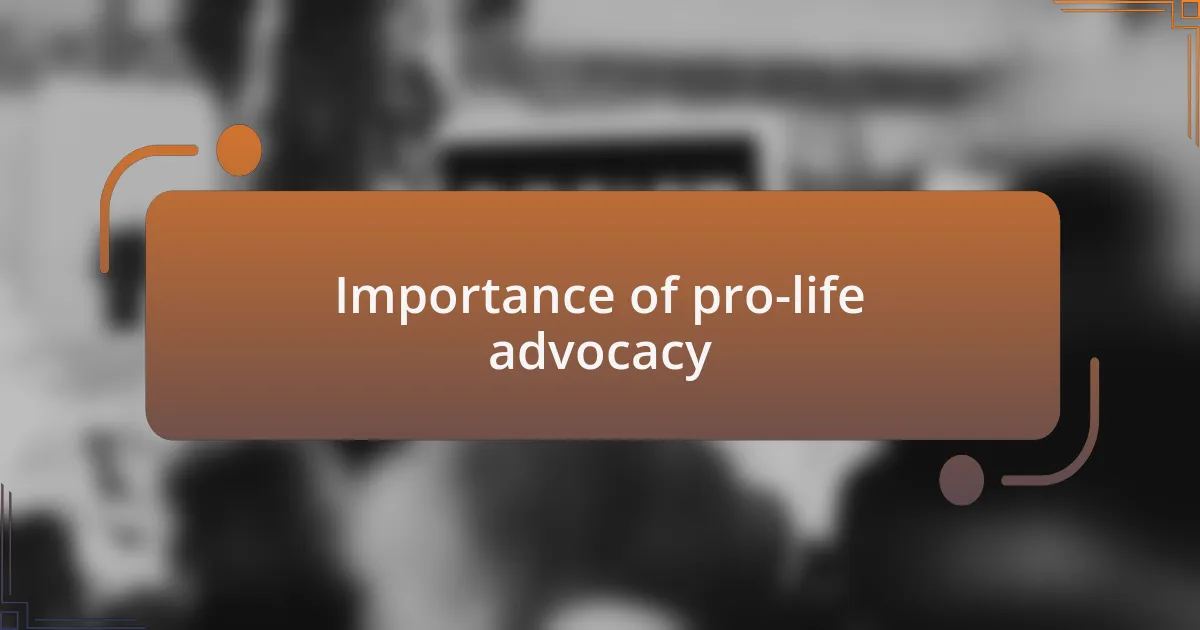
Importance of pro-life advocacy
Pro-life advocacy is critical because it emphasizes the intrinsic value of every human life, beginning at conception. I recall a powerful moment during a pro-life rally when a young mother shared her story about choosing life despite overwhelming circumstances. Her journey opened my eyes to the resilience and hope that can emerge from challenging situations, and it drove home the necessity of advocating for those whose voices might not be heard.
Engaging in pro-life advocacy also cultivates a sense of community among those who believe in the sanctity of life. I’ve seen how support networks develop around these shared values, creating spaces for individuals to connect, share experiences, and uplift one another. How often do we find ourselves empowered by a strong community standing up for what they believe in? This camaraderie reinforces our commitment to push for policies that protect the vulnerable.
Moreover, pro-life advocacy plays a vital role in shaping public perception and legislation. I remember a discussion with a lawmaker who mentioned how passionate constituents could sway legislative decisions. Isn’t it invigorating to realize that our voices can influence change? These interactions remind me that advocacy isn’t just about individual beliefs; it’s about rallying together to create a society that cherishes and protects all life.
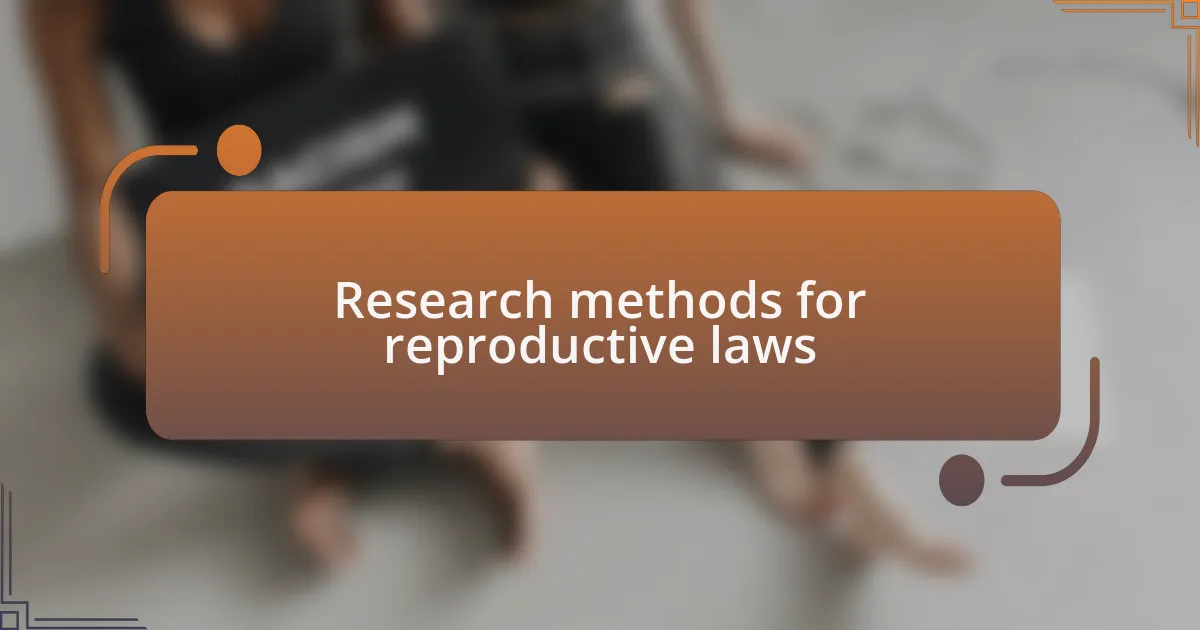
Research methods for reproductive laws
When it comes to researching reproductive health laws, I’ve found that diving deep into legislative databases is a good starting point. These databases often contain comprehensive records that reflect the evolution of laws over time. Each piece of legislation tells a story, and I often find myself contemplating how these laws affect real lives. How often do we think about the individuals behind these cases?
In addition to exploring official documents, engaging with advocacy groups provides invaluable insights. I remember attending a local seminar hosted by a pro-life organization where seasoned activists shared firsthand experiences regarding legal challenges. Listening to their stories not only deepened my understanding of legislative intricacies but also sparked my passion for the cause. Have you ever felt that rush of motivation after hearing someone’s heartfelt experience?
Finally, interviewing legal experts and healthcare professionals creates a nuanced perspective on reproductive health laws. I’ve conducted a few interviews that revealed stark contrasts between legal language and everyday experiences. These conversations reinforced the idea that laws can often be distant from the realities they aim to govern. Isn’t it fascinating how understanding the human element behind the law can fundamentally change our approach to advocacy?
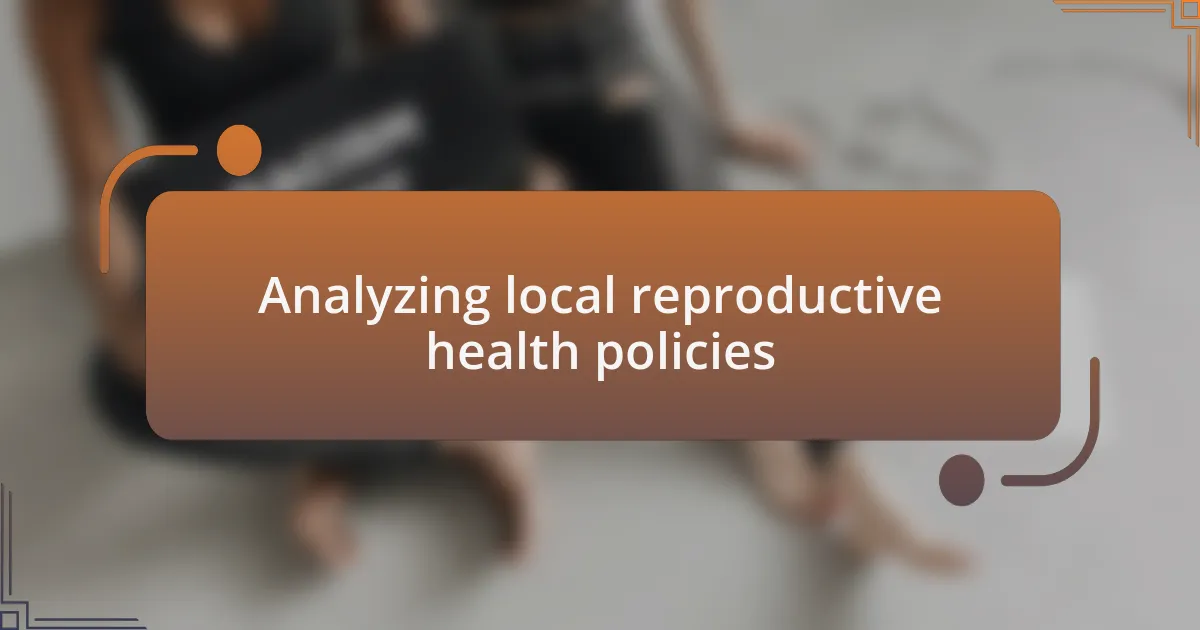
Analyzing local reproductive health policies
Analyzing local reproductive health policies requires a careful look at how different laws intersect with community needs. I remember reviewing a state policy that aimed to restrict certain reproductive health services, and it struck me how disconnected it felt from the voices of those it impacted. Have you ever considered how laws passed in distant chambers can shape the daily realities of individuals in your neighborhood?
I often find myself exploring the community feedback surrounding these policies. During a town hall meeting, I observed passionate discussions from locals who shared personal stories about accessing reproductive health services. Their narratives brought to light the stark realities that policy decisions can overlook. How can we as advocates better ensure that these voices are heard in the legislative process?
In my experience, collaborating with local healthcare providers unveils important insights about policy efficacy. I spoke with a nurse who described the hurdles patients face due to stringent laws, illustrating how legislation can create barriers rather than promote health. This raises a pressing question: do legislators fully grasp the impact of their decisions on healthcare delivery? Understanding these dynamics makes advocating for change not only necessary but urgent.
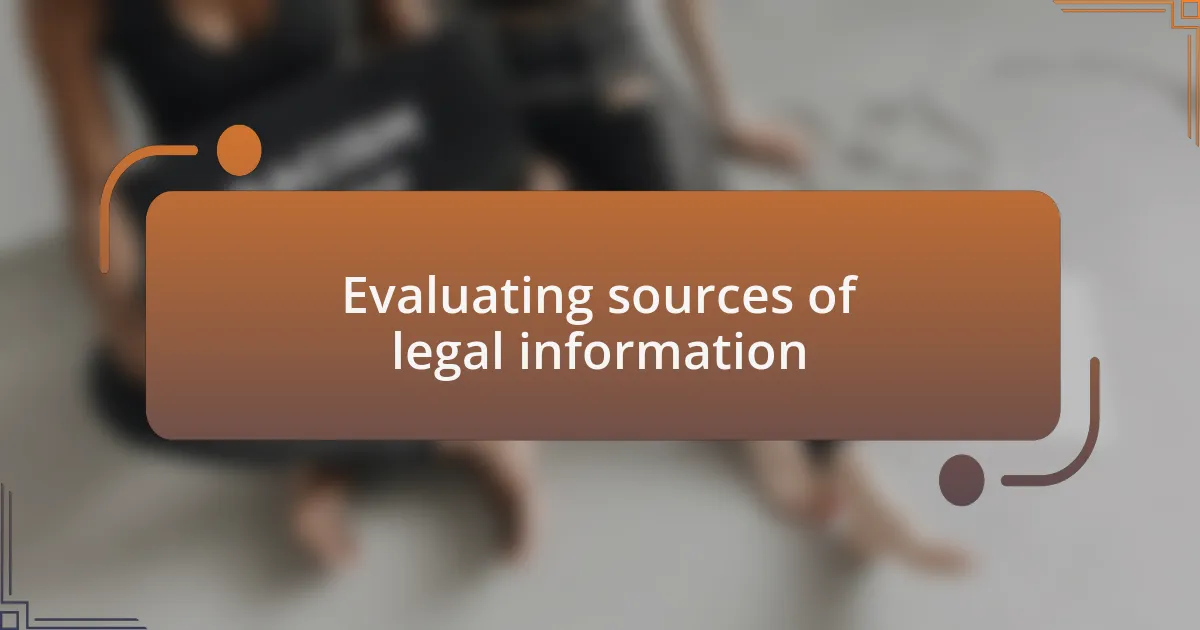
Evaluating sources of legal information
Evaluating sources of legal information is a task that requires both diligence and discernment. I remember sifting through various legal databases when researching reproductive health laws, and I quickly learned that not every source carries the same weight. It raises an important question: how can we tell which sources are reliable?
In my experience, checking the credibility of the authors and organizations behind legal documents can reveal a lot about the information’s trustworthiness. For instance, I encountered a report by a well-respected think tank that opened my eyes to the nuances of reproductive health policy. The rigorous methodology they used gave me confidence in their findings, which helped me articulate my stance better during discussions with peers. Have you ever felt that a well-founded source could bolster your argument?
Additionally, staying updated with reputable legal journals and government publications has proven invaluable in my research. I’ve found that these sources often provide the latest changes in laws, ensuring that my advocacy is based on the most current information. It’s crucial to distinguish between opinion pieces and data-driven research to avoid misinforming those we aim to support. How often do we stop to question the sources we take at face value?
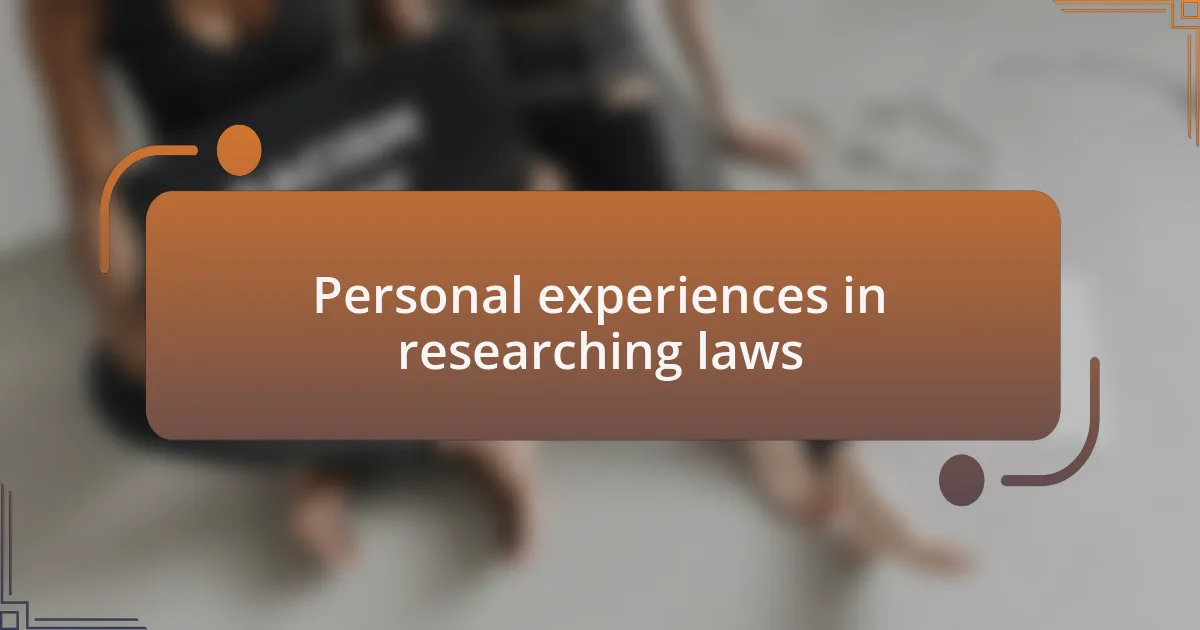
Personal experiences in researching laws
I recall a specific moment while digging into state-specific reproductive health laws that made me understand the real-life implications of these legal frameworks. As I read through case studies detailing the experiences of individuals affected by these laws, I felt a wave of frustration mixed with empathy. It struck me how legal language can seem detached, yet this research had a pulse; it echoed the struggles, hopes, and aspirations of those navigating these complex regulations.
One certainly memorable experience was attending a local town hall meeting where lawmakers were discussing proposed changes to reproductive health legislation. Listening to the impassioned views from both sides was transformative; it exposed me to the human side of legal debates that mere articles could not convey. Have you ever witnessed how personal stories can reshape our understanding of cold, hard facts?
On another occasion, I interviewed a legal advocate who explained the labyrinthine nature of legislative procedures. This conversation opened my eyes to the importance of grassroots activism in shaping laws that affect reproductive health. I left that meeting inspired and motivated, realizing that every piece of legislation has a backstory – and knowing that could make a difference in how I approach my advocacy work. Have you ever experienced that kind of clarity that sparks a commitment to change?
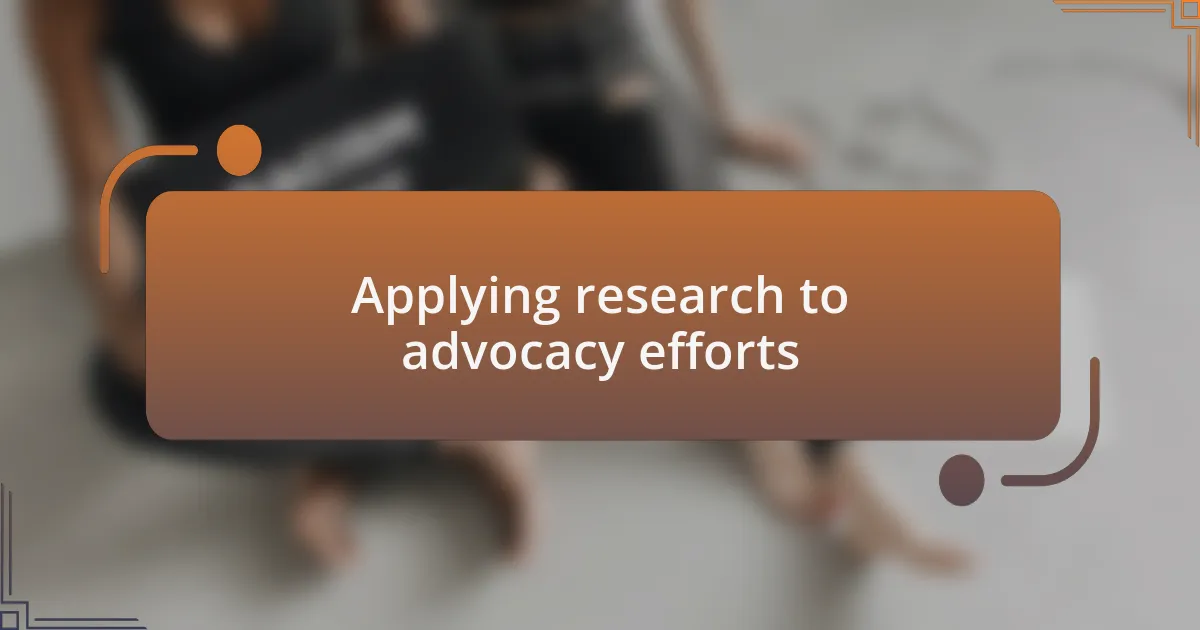
Applying research to advocacy efforts
Digging deeper into reproductive health laws not only informs our advocacy but also strengthens our resolve. I remember analyzing the data from recent studies showing how access to reproductive services impacts community health outcomes. This insight was eye-opening; I could see the direct link between advocacy efforts and tangible benefits for families. Doesn’t it motivate you to think that thorough research could empower others?
In another instance, I sat down with a grassroots organization dedicated to supporting women affected by restrictive laws. They shared compelling stories that highlighted the disconnect between legislative decisions and the realities on the ground. Hearing firsthand accounts ignited a passion within me to merge empathy with my research. Have you ever felt that spark when a personal story resonates deeply with your mission?
When engaging in advocacy efforts, I’ve found that presenting research-backed arguments can be a game changer. During public forums, I’ve utilized statistical data to counteract misinformation, making the case for reproductive health rights in a way that feels credible and relatable. Have you noticed how facts can shift the conversation when intertwined with personal experiences? By approaching advocacy with a blend of emotion and evidence, we can create a more compelling narrative that drives change.